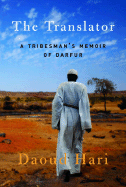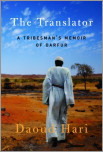

In the face of the appalling, unspeakable evil sweeping down on his family and his homeland, Hari notices the unexpected flares of goodness and the dignity of people bravely suffering and facing death in a country with no doctors. His compassion extends to the enemy as well, who is often nothing more than scared 14-year-old boys with big guns.
The book certainly contains a few eye-popping horrors, though never unnecessarily, and if the occasional violent image is nightmarish, it's because Hari is a haunted man simply sharing his ghosts with you. He's also a delightful narrator, with his love of camels (he thinks they're beautiful) and his fear of crossing over water.
As far as sheer writing goes, Dr. John and Ali, the two men who accompany Daoud on the final third of the memoir, are as sharply defined as any characters in a good novel, and their battering odyssey together cancelled all my plans, since I was unable to leave my armchair during the final nail-biting 70 pages.
It's taken me several days to recover from the book. As a writer and as a man, Daoud Hari is my personal hero. No one can tell you what is happening in Darfur better than he can.--Nick DiMartino

